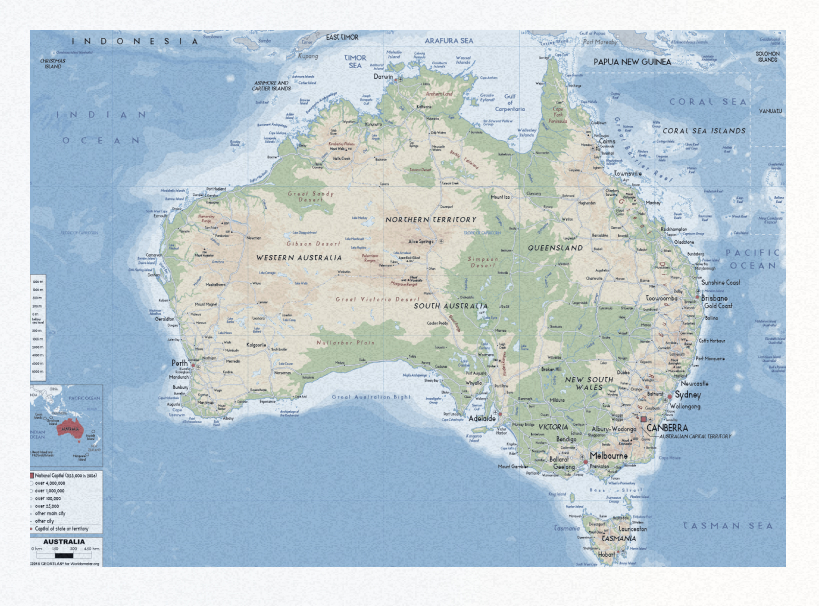
Market Spotlight:
Australia

Factum Scale:
-
Australia’s regulatory environment is transparent and efficient, according to the World Bank’s Doing Business Archive, and is favorably ranked in terms of starting a business, access to credit, and contract enforcement.
-
Australia is also ranked eleventh in the world in dealing with construction permits – processes related to building a warehouse such as obtaining plans and gaining clearances are accomplished very quickly.
-
Australia is known for its stable political environment, which provides a predictable and secure setting for business operations. The country’s democratic system ensures accountability in government policies affecting businesses.
-
All of the major cities in Australia are well-connected through highway networks, ports, and airports, providing logistical advantages to businesses through the well-developed transportation network.
-
The Australian government prioritizes international businesses that work in the best interest of their country. Australia is particularly receptive to foreign investments that are related to sustainability, housing, and technology.
-
Australia has robust intellectual property (IP) laws that provide strong protection for patents, trademarks, copyrights, and designs. The country is a member of the World Intellectual Property Organization (WIPO) and adheres to international IP agreements.
-
On the downside, many layers of government regulation and red tape for business investment is often frustrating to business owners and investors.
Tariffs & Regulations
Factum Scale:
-
Australia has established Free Trade Agreements (FTAs) with 18 countries, including major economies such as the United States, Japan, China, South Korea, and India. These trade agreements allow Australian businesses to position themselves on an international scale.
-
Australia is committed to maximizing trade partners with a low tariff rate of 1.8% which puts minimal strain on international trade compared to a nation like India, where their most favored nation tariff rates are 13.8%.
-
Most goods and services sold and/or consumed in Australia are taxed at a 10% Goods and Services Tax (GST). This tax is imposed on businesses with a general turnover of $75,000 AUD or greater.
-
Australia has extensive import regulations to preserve biosecurity and protect local industries and ecosystems. All imports, particularly food and agricultural product,s are subject to rigorous quarantine inspection and clearance processes.
-
The standard full company tax rate in Australia is 30%, while eligible companies can operate at the lower company tax rate of 5%.This reduction is part of the government’s effort to support small businesses, however it is high in comparison to the US, where the standard full company tax rate is 21%.
-
The regulatory environment in Australia is conducive for business operations. The Australian Securities and Investments Commission (ASIC) and Australian Competition and Consumer Commission (ACCC) are governing bodies that regulate financial markets and ensure competition and fair trade.
Fluency in English
Factum Scale:
-
English is the official language of Australia and the primary language used in business, government, education, and media.
-
As Australia is home to a plethora of cultures, a significant portion of the population speaks a language other than English at home. The Australian Institute of Health and Welfare cites that 23% of the population (6 million citizens) speaks a language other than English at home, including Mandarin, Arabic, and Vietnamese.
Society, Culture, and Business Etiquette
Factum Scale:
-
Australian culture promotes direct and informal communication, valuing straightforwardness and honesty. This truthful approach in a business atmosphere facilitates more efficient business interactions. Like in many other cultures, relationship building and kindness with your counterpart will go a long way to a trusting working relationship.
-
A healthy work-life balance is very important to Australians, as working arrangements and leave entitlements tend to be flexible in Australian businesses. Employers and businesses understand how balancing professional and personal time positively impacts well-being and productivity.
-
As a multicultural nation, Australian businesses typically place an emphasis on diversity and inclusion. Australia’s gender equality and anti-discrimination laws are quite progressive, which tend to create positive and inclusive work environments
Economic Stability
Factum Scale:
-
Australia has not experienced a major recession since 1991-1992, when excess demand and high interest rates plagued the economy. Even through global economic downturns, Australia has managed to maintain stability and rebound quickly.
-
The multifaceted economy in Australia reduces vulnerability to sector-specific decline. Mining, agriculture, manufacturing, and services (e.g., finance, tourism and education) are key sectors for the national economy.
-
The Australia 2030 initiative is a government investment project seekinging to promote business innovation and growth through various grants. Australia, a country that endeavors to be recognized for its science, research, and commercialization on a global scale, introduced this initiative to promote growth in these sectors.
Labor
Factum Scale:
-
Australia uses its immigration policies to attract skilled labor from overseas. The Priority Migration Skilled Occupations List (PMSOL) provides several visa subclass options to skilled laborers in an effort to enhance the nation’s talent pool for businesses.
-
The Australian population has high levels of education, with about 51% of the population aged 25-64 holding a tertiary educational qualification as of 2022.
-
The unemployment rate, as of April 2024, is 4%, with a 14.7% increase in unemployment since April 2023. Labor market policies as well as prosperity in sectors like mining and construction have contributed to this ease in unemployment. Today, approximately 592,800 workers are unemployed.
-
During the 2022-2023 financial year, there were 130,000 retirees, those of whom have an average age of 56.9 years at retirement.
-
New South Wales is currently the most prosperous state economy in Australia, with 4,426,200 employed and an unemployment rate of 3.9%, the second lowest of all states.
Business Structures
Foreign operators and investors have a variety of business structures to choose from in establishing a business in Australia, including:
-
Sole Trader: A sole trader is an individual operating a business under their own name or a registered business name. Australia’s stable economic environment and support for small businesses through grants and programs make it an ideal place for sole traders
-
Partnership: A partnership structure is a business owned by two or more people. Australia’s legal framework provides clear guidelines for partnerships, ensuring protection for all partners. The government provides tax benefits and government support systems for small to medium enterprises (SMEs)
-
Cooperative: A cooperative is an organization owned and operated by a group of 5+ individuals for their mutual benefit. Australia has supportive regulations for cooperatives, promoting democratic control and equitable profit distribution. The country’s cooperative sector, especially in agriculture and retail, benefits from strong community support and government initiatives.
-
Franchise: Franchises are a business model where a franchisor grants the franchisee the right to operate a business using the franchisor’s brand and system. Australia’s consumer market is receptive to franchised businesses, supported by strong legal frameworks like the Franchising Code of Conduct. The country’s thriving economy and a culture of entrepreneurship make it an ideal market for franchises.
-
Public Company (Ltd): A public company can offer shares to the public and is typically listed on a stock exchange. Australia’s well-developed financial markets and regulatory oversight by the Australian Securities and Investments Commission (ASIC) and the Australian Stock Exchange (ASX) offer a secure and transparent environment for public companies.
Business Landscape
-
The strong services sector in Australia contributes to over 70% of the GDP and employs about 80% of the workforce. Finance, healthcare, education, and tourism are major components of the services sector, with finance as one of the more highly-developed industries.
-
Australia has a strong startup ecosystem, supported by major cities including Melbourne, Sydney, and Brisbane. The government has a Research & Development (R&D) Tax Incentive which offers tax offsets for companies engaged in R&D activities
-
The GDP and export revenue in Australia heavily relies on the mining industry, as it is the highest mineral and metal exporter in the world. The significant demand and investment of materials like iron, coal, gold, and bauxite makes a strong impact on the economy.
-
The heavy manufacturing industry in Australia has diminished significantly over the past 20 to 30 years and has led to reliance on imports from countries like China and South Korea
Notable Institutions
-
Commonwealth Scientific and Industrial Research Organisation (CSIRO): CSIRO is Australia’s national science agency and one of the largest and most diverse scientific research organizations in the world. CSIRO is known for several groundbreaking inventions and contributions, such as the development of Wi-Fi technology, polymer banknotes, and advancements in cotton farming techniques.
-
Austrade: Austrade is an Australian government agency that promotes international trade, investment, and tourism. This agency developed the Export Market Development Grants (EMDG) program and has been successful in increasing investment value in Australia .
-
Garvan Institute of Medical Research: The Garvan Institute is a leading biomedical research institute focusing on genomics and personalized medicine. It participates in leading research for genomics and personalized medicine, and contributes to diabetes and metabolic disease research.
-
Australian Broadcasting Corporation (ABC): ABC is Australia’s national public broadcaster, providing independent news, information, and entertainment. This broadcaster provides high-quality, independent journalism and produced award-winning programs like “Four Corners” and “Bluey”.
-
Australian National University (ANU): ANU is a leading research-intensive university located in Canberra, known for its academic excellence and global ranking. The university is home to multiple Nobel Prize winners such as astrophysicist Brian Schmidt. ANU has made many contributions to the studies of astrophysics and earth sciences.


